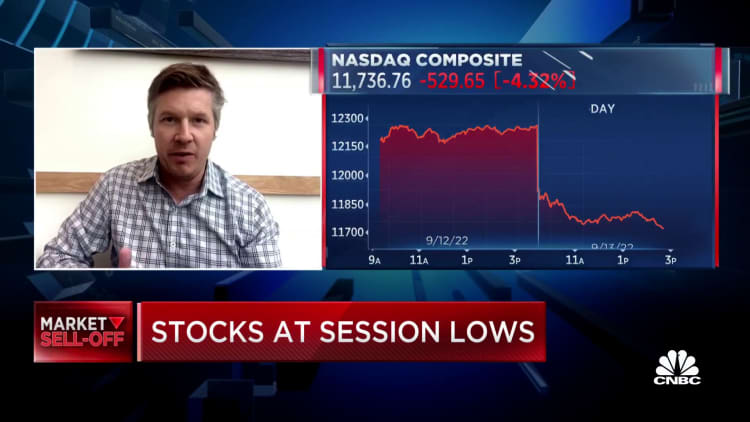Tech stocks crushed in market selloff
The six largest tech U.S. tech companies lost more than $500 billion Tuesday after an unexpectedly high August inflation report sent tech stocks tumbling.

- The six largest U.S. tech companies lost more than $500 billion Tuesday after an unexpectedly high August inflation report sent tech stocks tumbling.
- The Nasdaq Composite sank 5.16% to end the day at 11,633.5, steeper than any day since June 2020.
The six largest U.S. tech companies lost more than $500 billion in value Tuesday after an unexpectedly high August inflation report sent tech stocks tumbling. The consumer price index was up 0.1% for the month and was up 8.3% year over year, even as gas prices fell.
The Invesco QQQ ETF, an exchange-traded fund tracking the 100 most highly valued non-financial companies listed on Nasdaq, endured a 5.5% decline in its worst trading day since March 2020. The fund’s top 10 holdings include Apple, Microsoft, Amazon, Alphabet, Meta and Nvidia.
related investing news
The Nasdaq Composite sank 5.16% to end the day at 11,633.5, steeper than any day since June 2020. The Dow Jones Industrial Average slid 1,276.37 points, or 3.94%, to close at 31,104.97 and the S&P 500 dropped 4.32% to 3,932.69.
Here are the companies that posted some of the biggest losses:
- Apple lost $154.11 billion in market cap and fell 5.87%, its steepest drop since Sept. 2020
- Microsoft lost $109.33 billion and fell 5.5%, its steepest drop since Sept. 2020
- Alphabet (which owns Google) lost $85.32 billion and fell 5.9%, its steepest drop since Mar. 2020
- Amazon lost $98.11 billion and fell 7.06%, its steepest drop since May 2022
- Meta (formerly Facebook) lost $42.55 billion and fell 9.37%, its steepest drop since Feb. 2022
- Nvidia lost $34.21 billion and was down 9.47%, its steepest drop since March 2020
The August inflation report is one of the last the Fed will see ahead of their Sept. 20-21 meeting, where the central bank is expected to deliver their third consecutive 0.75 percentage point interest rate hike to tamp down inflation. The report could lead the Fed to continue its aggressive hikes longer than some investors anticipated.
